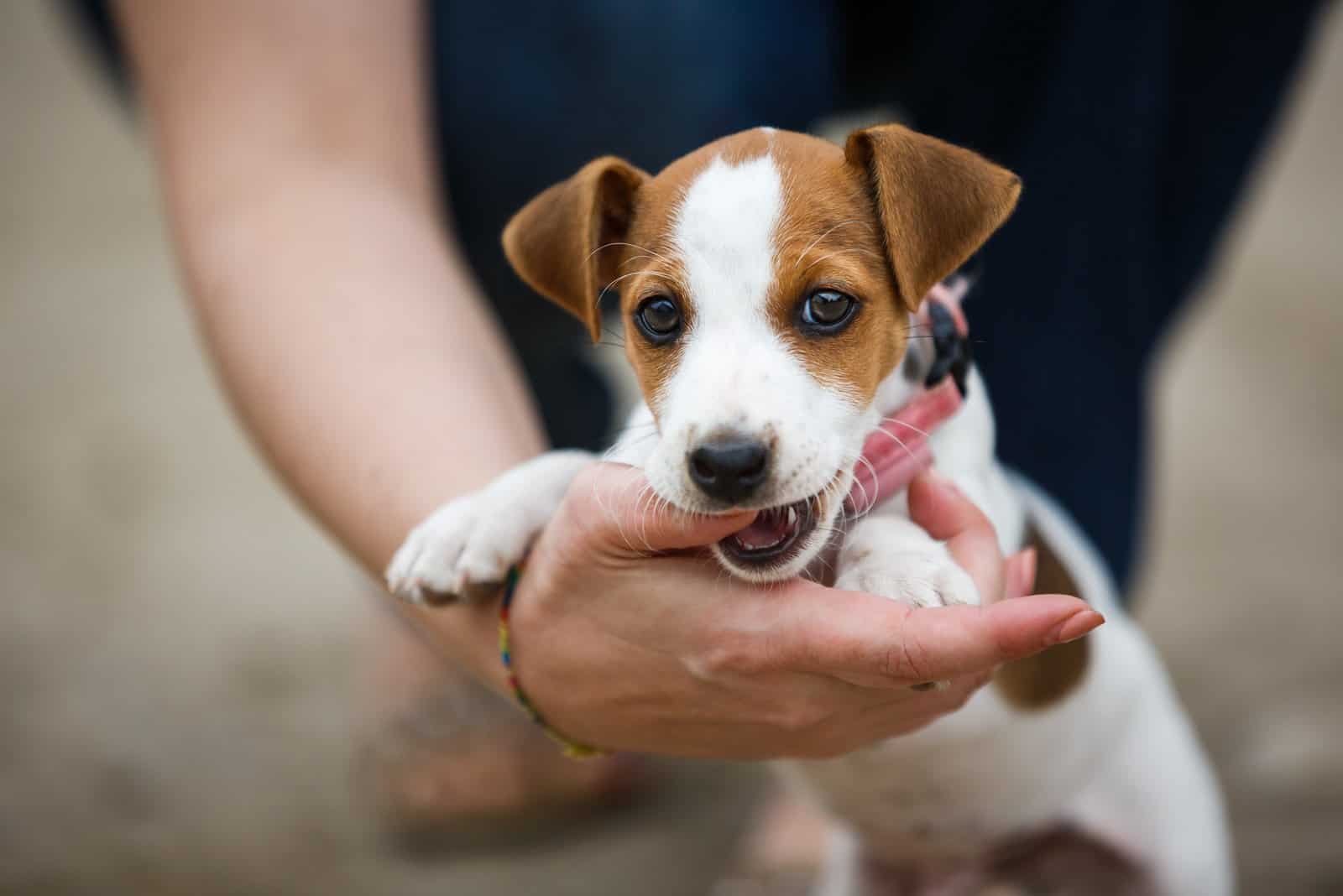I’ve had many people complain to me about their new pup’s behavior. “My puppy won’t stop biting me, I’ve tried everything!” being one of the most common ones.
But, have you really tried everything to stop your new four-legged friend from nibbling on you and everything around you?
Don’t worry! Every dog owner has experienced the phase of puppy biting, mouthing, and nipping. And, we all know how frustrating it can get.
Getting a new puppy is very exciting and fun. However, most new owners aren’t aware of the fact that going through the puppy’s teething phase is everything but fun.
This is a common and completely natural puppy behavior. In fact, all dogs go through their biting phase when their first teeth start appearing.
Some puppies bite full time, nipping and mouthing everything and everyone. On the other hand, some puppies bite less frequently.
You might think that your puppy dislikes you, but that’s not the case. Puppies won’t bite out of spite. There are many reasons why puppies tend to bite and nibble.
So, if you’re curious to find out why puppies display biting behavior and how to prevent it, keep reading this article!
Why Does My Puppy Bite Everything?
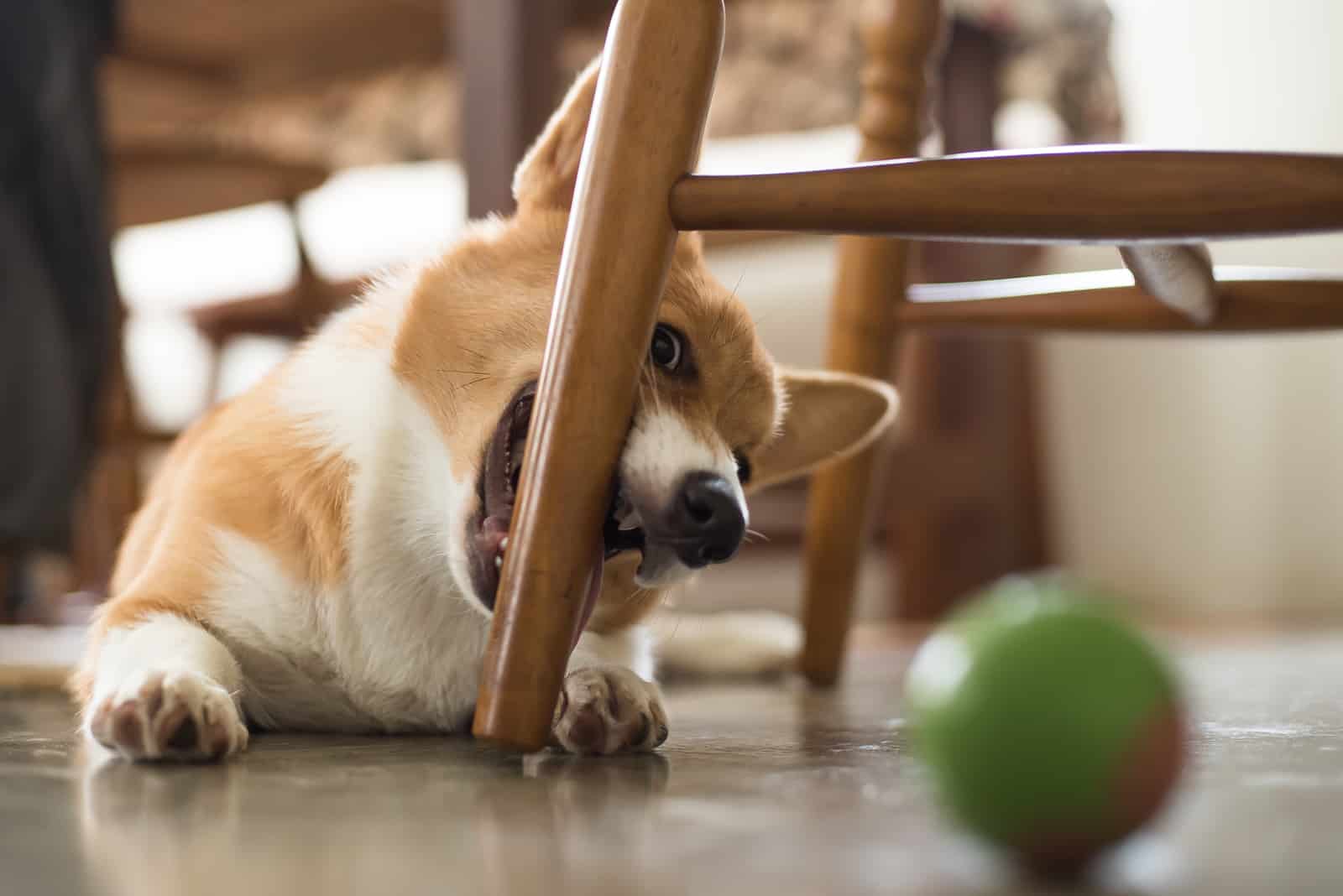
We usually hear this question from first-time dog owners. The puppy is biting the couch, demolishing every plush toy it gets; always nibbling on the human hands and chewing the pillows… but, why?
Well, puppies are simply like that. They were born that way, and there is no chance that a puppy won’t display this behavior in its life.
Biting behavior is a common thing among all dog breeds. This kind of dog behavior has been there since the beginning of the canine kind.
Not only do puppies do it, but so do other mammals – including human babies!
Dog bite behavior
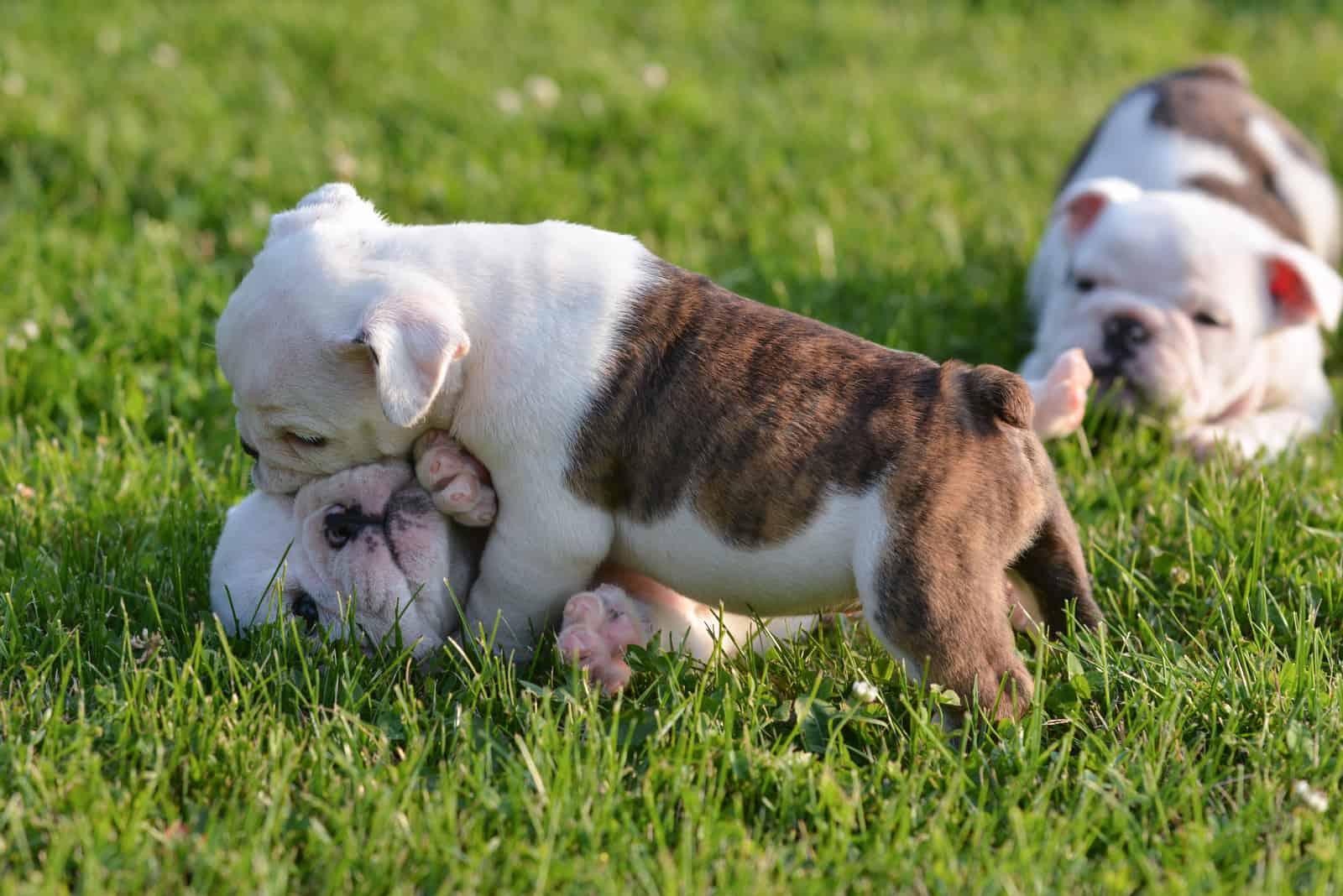
When you observe a group of puppies in a litter, you’ll notice that they frequently bite each other. This is the equivalent of a human hug.
In fact, puppies show affection towards their littermates by giving them love bites!
Puppies usually bite during playtime – it’s their way of interacting with other littermates. You have probably already seen a bunch of puppies playing and wrestling with one another.
The other reason why a puppy would bite is because it’s getting to know its surroundings.
Remember that puppy nibbling is normal dog behavior. So, if your puppy is like this, you should be happy rather than frustrated. It means that it’s a healthy puppy that’s growing up in a perfectly normal way.
Different dog breed, different behavior
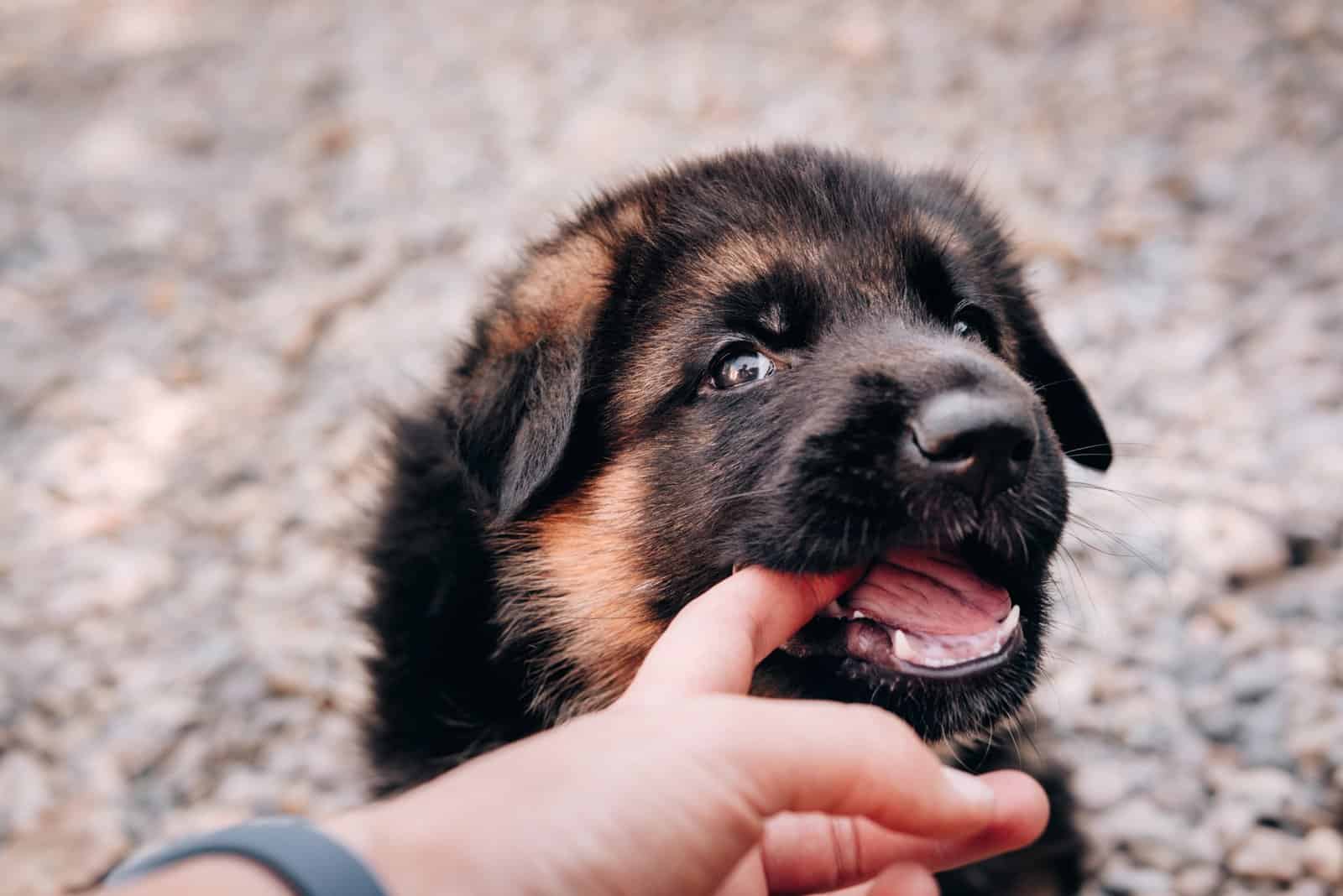
What plays an important role here is the dog breed in question. We see different dog bite behavioral patterns in different dog breeds. Here’s a really cool example of dog biting behavior.
Let’s take a look at the dogs from the herding group: the German Shepherd, the Border Collie, the Australian Cattle dog, the Belgian Malinois, and so on.
These dogs have been bred to herd farm animals. Herding dogs inherited a type of bite behavior that is specific only to them.
When gathering livestock, herding dogs would slightly nibble on the animal’s legs to make it move. When you think about it, it’s a very smart method these dogs developed.
This inherited behavior can be seen in little puppies of herding dog breeds. These puppies like to nibble on your legs. But, you are certainly not a cow, and you should let your new puppy know that!
The first mistake all new dog owners make
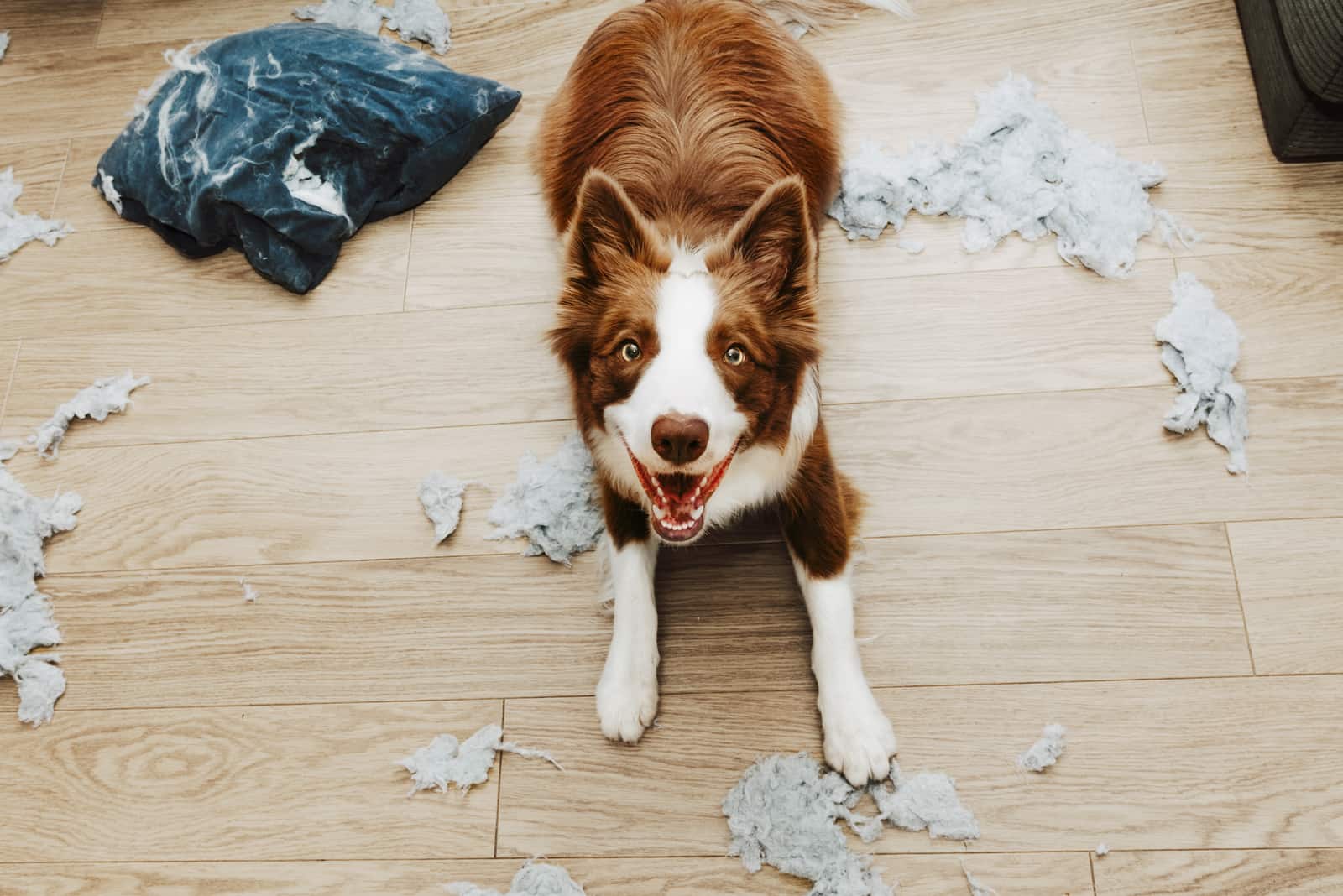
Well, believe it or not, you might be the reason why your puppy continues to bite you, everything, and everyone around you.
Whenever new dog owners get a puppy, they just can’t keep their hands off of it! This is understandable because puppies are little, irresistible balls of fur!
But, most puppies will want to play all the time.
During puppy play, new owners tend to use their hand instead of dog chew toys. This means that the hand will appear as a plaything to a new puppy. Just like they would with toys, puppies will want to grab it, chase it, and bite it.
Although it might seem cute when a little puppy chews on your hand with its little teeth, it wouldn’t be so cute if an older dog did it.
If not prevented in time, puppy biting can continue to the adolescent period, and might even go on in adulthood.
Puppy Biting And Nipping: How Long Does It Last?
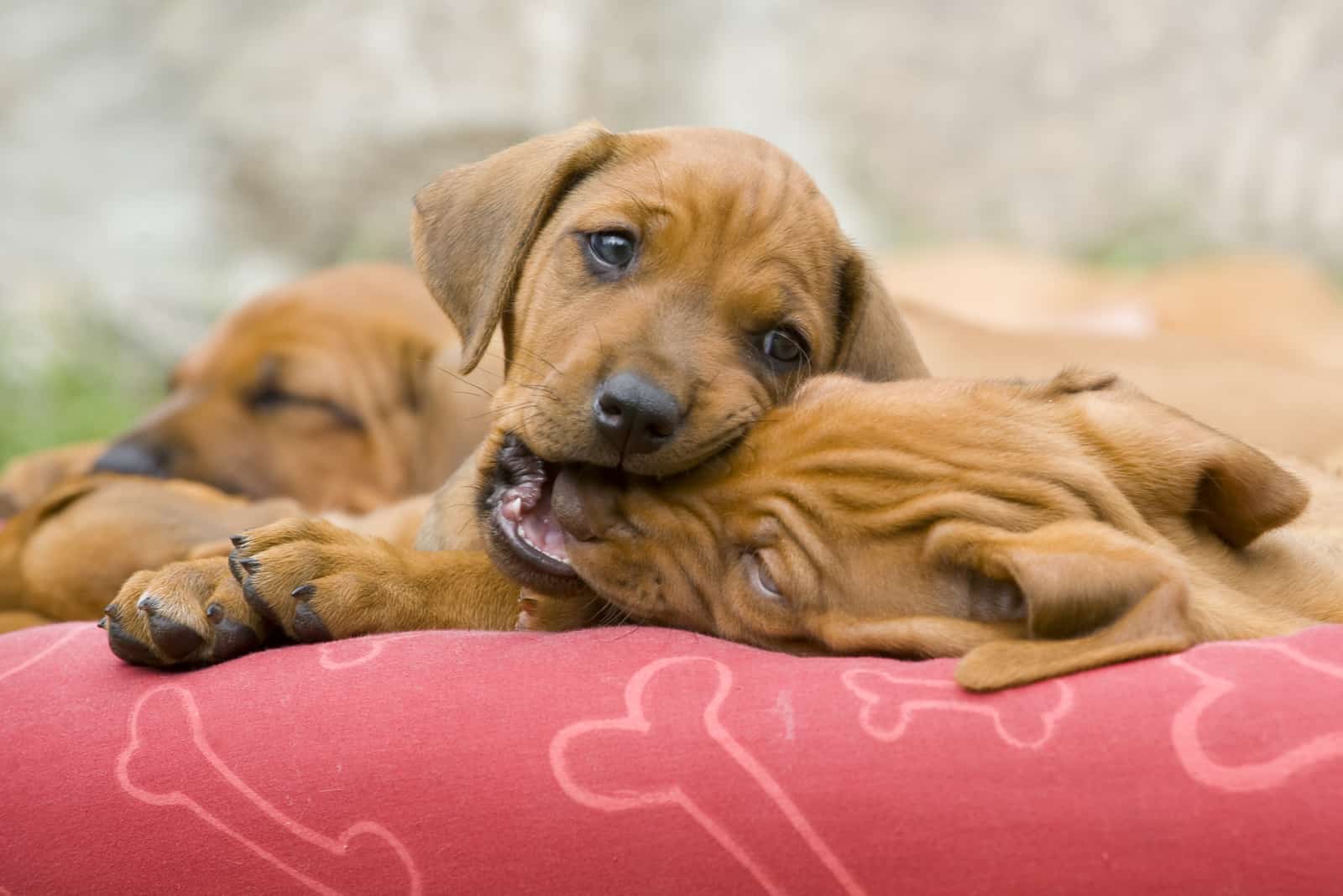
A puppy’s teeth emerge as early as two weeks after birth. This is an estimated time period, which can vary from one dog breed to another.
Puppies don’t start biting as soon as their first teeth emerge. The biting starts a bit later when almost all deciduous teeth are fully in.
Deciduous teeth are the first teeth. Some call them baby teeth, or in this case – puppy teeth. As puppies grow, their puppy teeth fall out and are soon replaced with adult teeth.
To be more precise, all deciduous puppy teeth will be in by six weeks of age. And by 12 weeks of age, most puppy teeth will fall out and be replaced with adult teeth.
Now, puppies must use their teeth for new dog food they have just transitioned to. This is a slow process in which the puppy learns to eat on its own. What also happens is that its tiny teeth start becoming stronger.
Puppy teeth are very tiny, very thin, and extremely sharp. Getting bitten by a small puppy is like getting a few needles in your skin. Those sharp teeth are not to be messed with! Puppy bites can be very painful!
Puppy biting doesn’t last forever. It usually lasts between four and six months. And, the good thing is that it is just a phase that your puppy will eventually grow out of.
In some cases, this phase can be prolonged, but that’s usually because some dog owners don’t teach their puppies to stop biting.
The Art Of Puppy Bite Inhibition
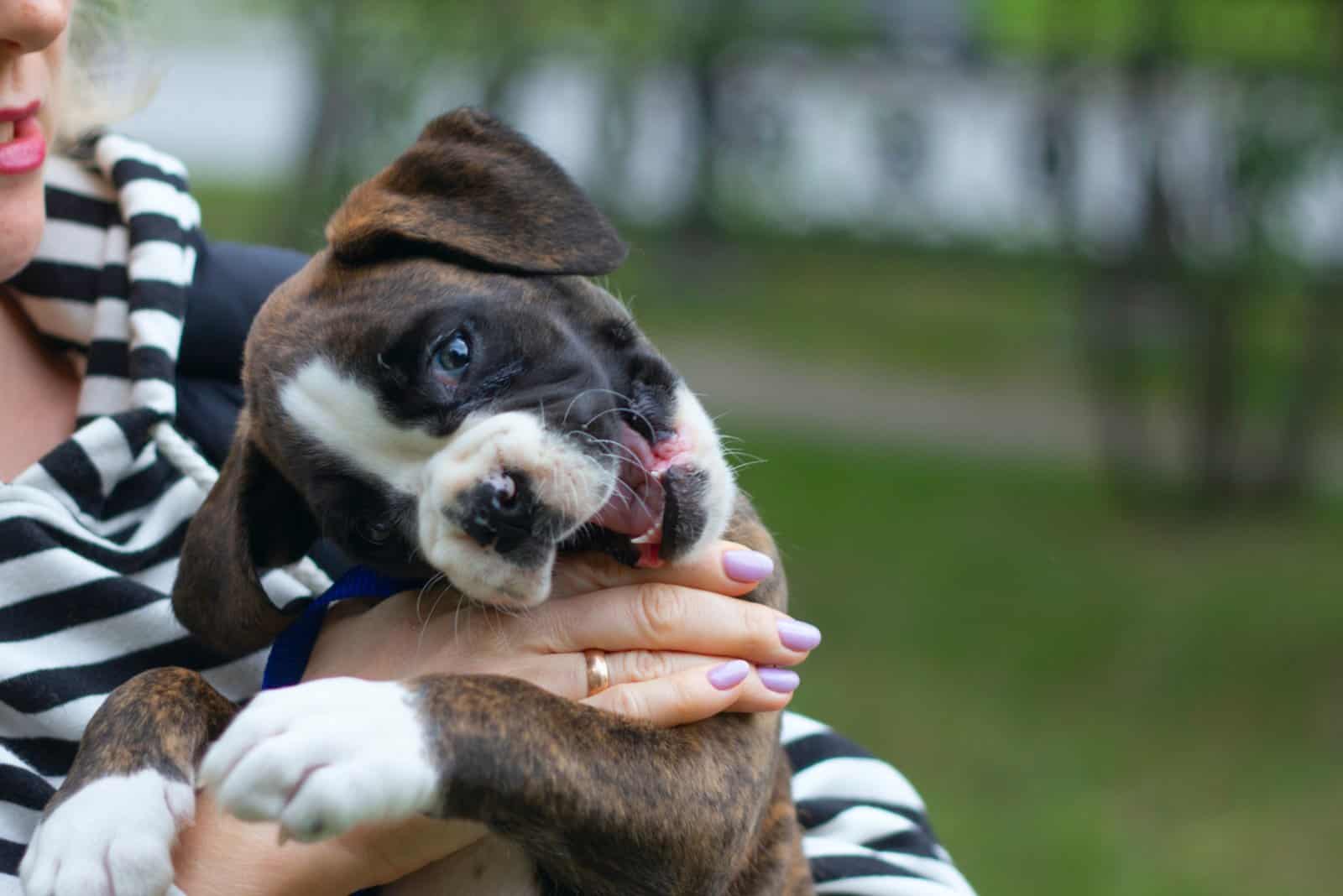
Puppy bite inhibition is defined as the puppy’s ability to understand when enough is enough in terms of play biting. It’s a very important lesson that your new puppy must learn.
A puppy that has learned bite inhibition recognizes the pain tolerance and pain threshold of other dogs and humans.
This means the puppy acquires the feeling for the strength of its bite. In other words, it knows when the bite is too strong, and when to stop.
We have come up with a list of 10 ways to train your puppy to stop puppy biting. If done right, these simple steps will help reduce and stop puppy nipping.
You can also look at this as a short “survival guide” that will help you survive the teething phase of your new puppy.
10 Ways To Stop Puppy Biting
What if you haven’t tried everything to prevent your new puppy from biting you?
Check out some of these training tips!
1. Early socialization.
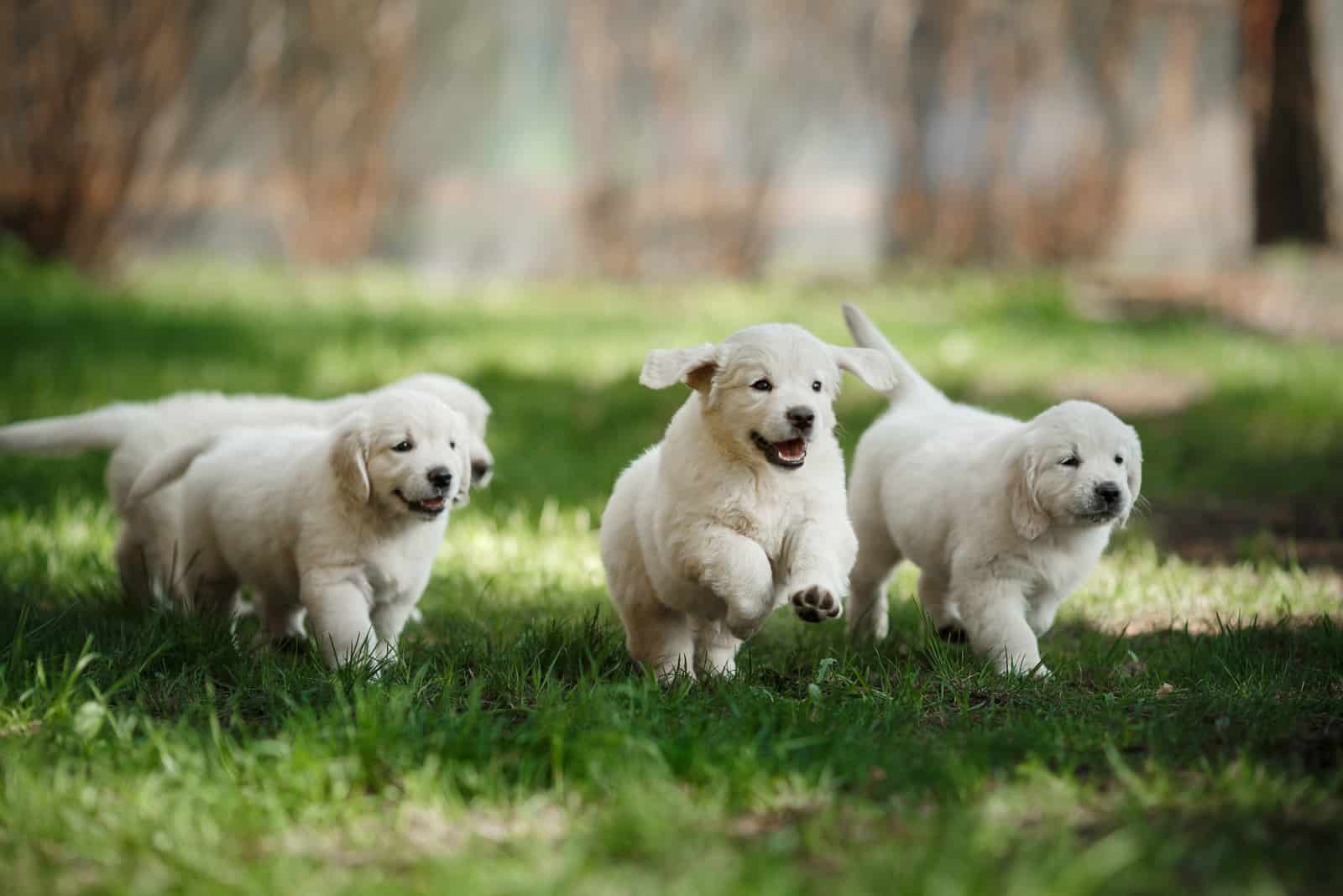
This is one of the most important, if not the most important thing you should remember when deciding to get a new puppy.
Dogs are a friendly species. They enjoy company, and they love interacting with other dogs. Just remember that it once was so hard leaving your puppy home alone for the first time , but he managed to get used to spending a couple of hours without you.
Just like he overcame his separation anxiety, your new puppy will also learn how to interact with other humans and other dogs.
Early socialization helps your new puppy feel relaxed and calm when going outside to see new people and new animals.
By socializing your new puppy, you’re allowing it to meet other dogs. Once it makes new friends, naturally it will try to mimic their behavior. This can be a great way for a little puppy to learn good behavior from its dog teachers.
Keep in mind that sometimes, dogs get into rough play, so it’s best that you always keep an eye on them!
2. Redirecting puppies to other objects.
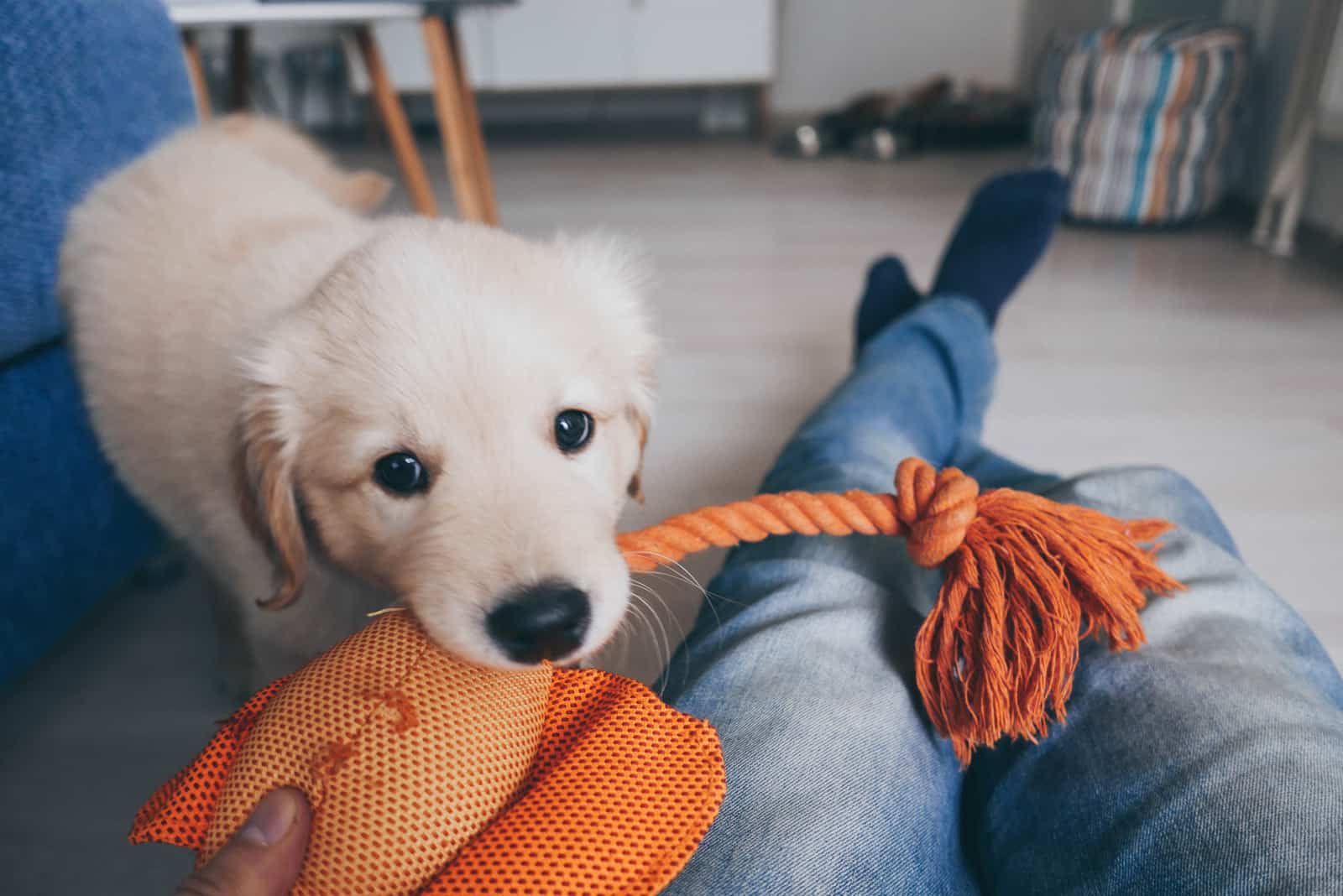
We know puppies are extremely energetic. They’re all over the place! Sometimes, it seems impossible to stop their zoomies!
When a puppy starts nibbling on your hands during playtime, you can take its attention off of you by introducing other objects. You should always have some chew toys like dog kongs around.
So, you simply limp your hand and move it slowly away from the puppy. You take a chew toy and put it in front of your puppy instead of your hand.
It will surely hang onto it and forget about biting you. This step should be repeated daily for better results.
Once your puppy takes the chew toy, you can give it a treat for being a good boy, and practice positive reinforcement.
Puppy kongs are soft, rubbery chew toys great for little puppies. What’s awesome about the kong is that you can fill it with puppy food. This will keep your puppy occupied for hours, and it is a great tool used in dog training to prevent excessive chewing and anxiety.
3. Positive reinforcement training.
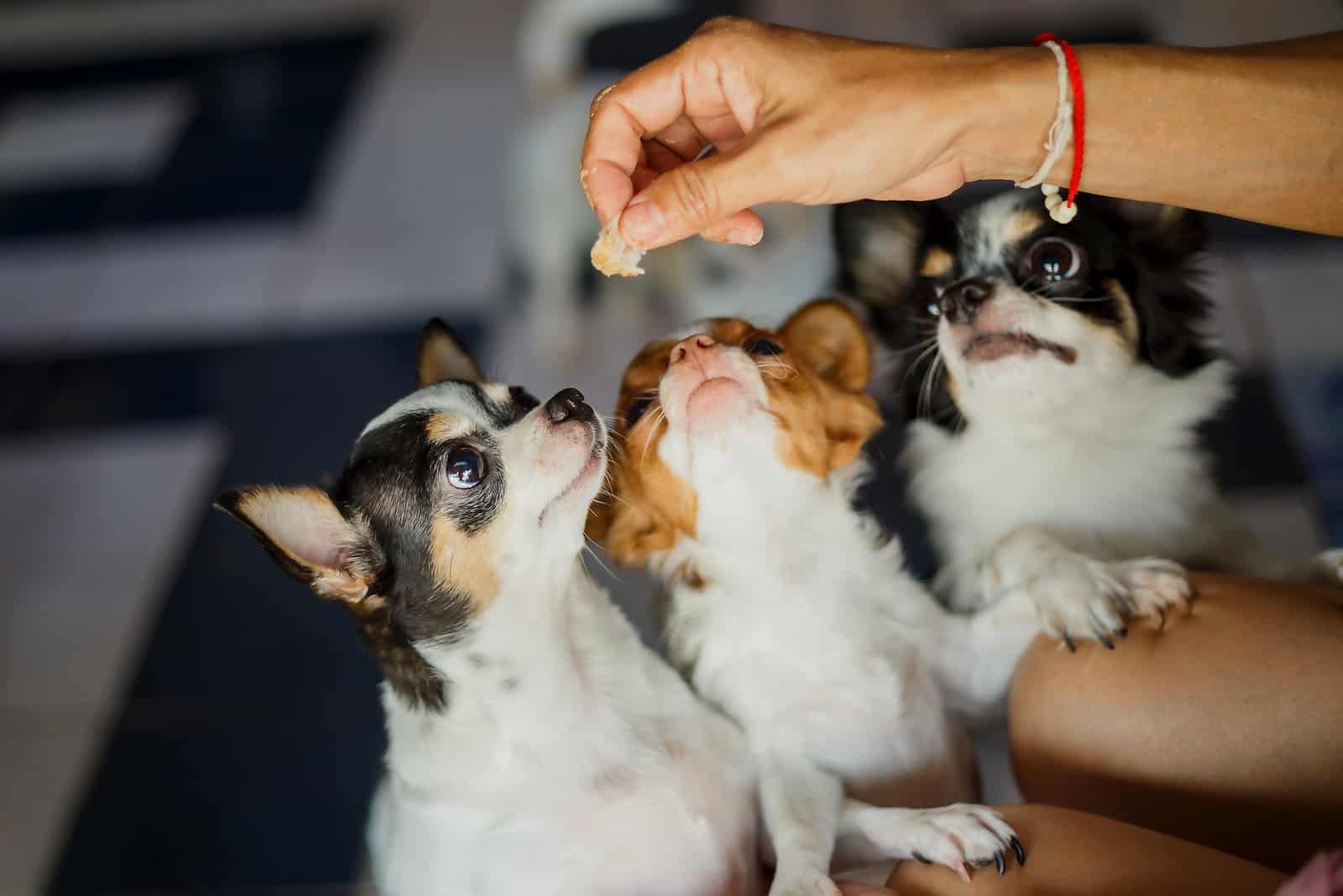
This training method is used by all dog owners, and it works almost all the time. That’s because your new puppy will do anything for that delicious treat.
And, who can blame them? Most of us would do the same!
What this actually is doing is rewarding good behavior with yummy puppy treats and snacks. Find the treat your puppy loves the most and include it in a regular training routine.
You should always use positive reinforcement, especially in crate training, voice command training, and clicker training.
Not only should you reward your puppy when it does what you tell him to, but you should also reward any kind of positive behavior. And, sometimes that can be the smallest things like whenever you notice your new puppy isn’t actually trying to nibble on you and your family members – reward it with a treat!
When your new puppy decides to nibble on a chew toy instead of your hand – reward it with a treat!
When your new puppy licks your hand instead of biting it – reward it with a treat!
Puppies will soon realize that if they do something right, they’ll be rewarded with a tasty, mouth-watering treat!
So, keep repeating this method because it will have a good effect on your puppy’s behavior!
4. Clicker training.
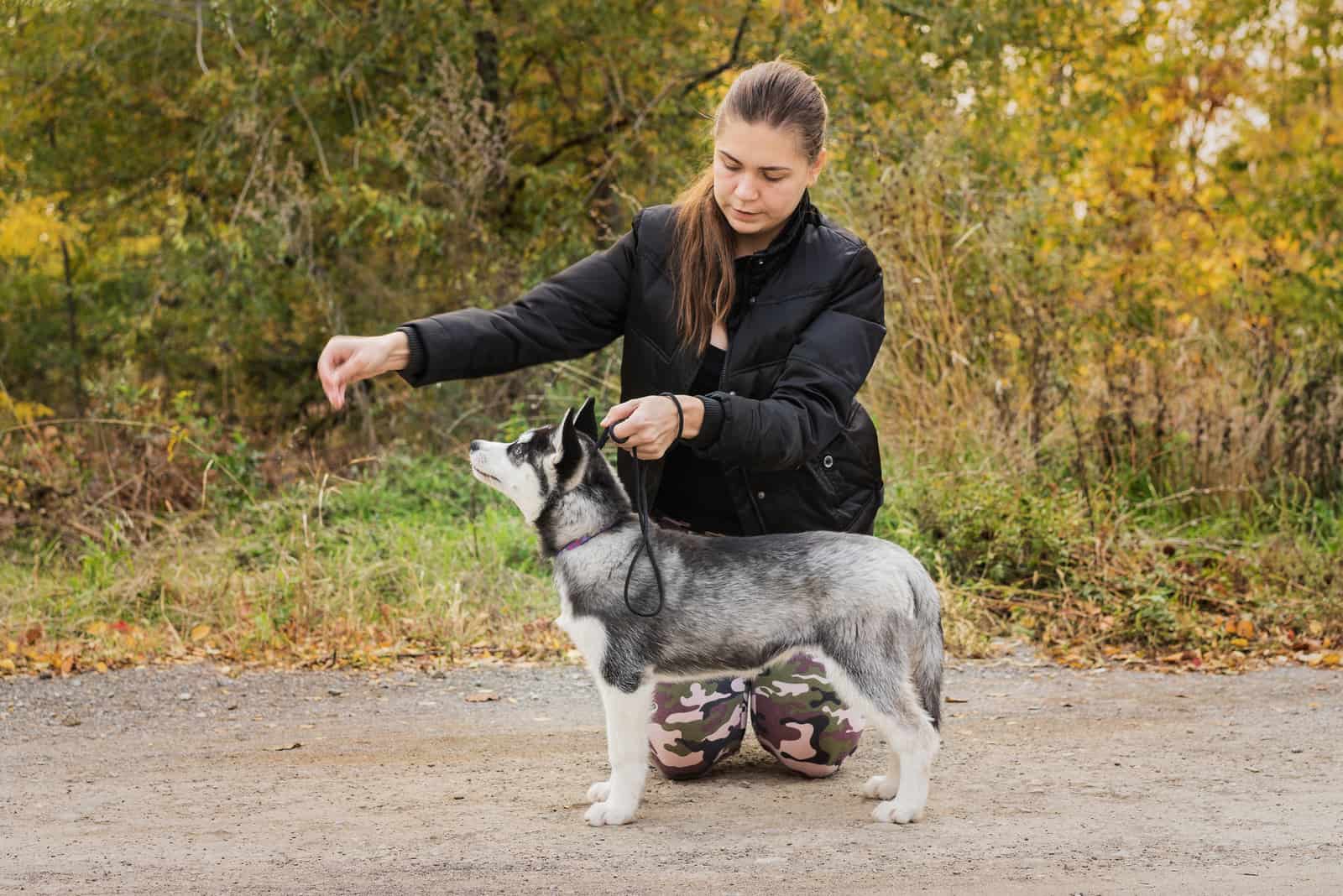
Clicker training is to be combined with other methods of puppy training. For example, you taught your new puppy to respond to the voice command “SIT”, and now you want to reward it with a treat.
This is where the clicker takes part. The “click” should be right between the voice command and the treat reward.
So, every time your new puppy does something right, a click should follow. The whole clicker training looks like this: command – click – treat.
Soon, your puppy will connect these three parts and start behaving better with each passing day. It’s important to be persistent.
You can find puppy clickers on Amazon for a really cheap price, usually ranging from $2 to $5.
5. Start yelping.
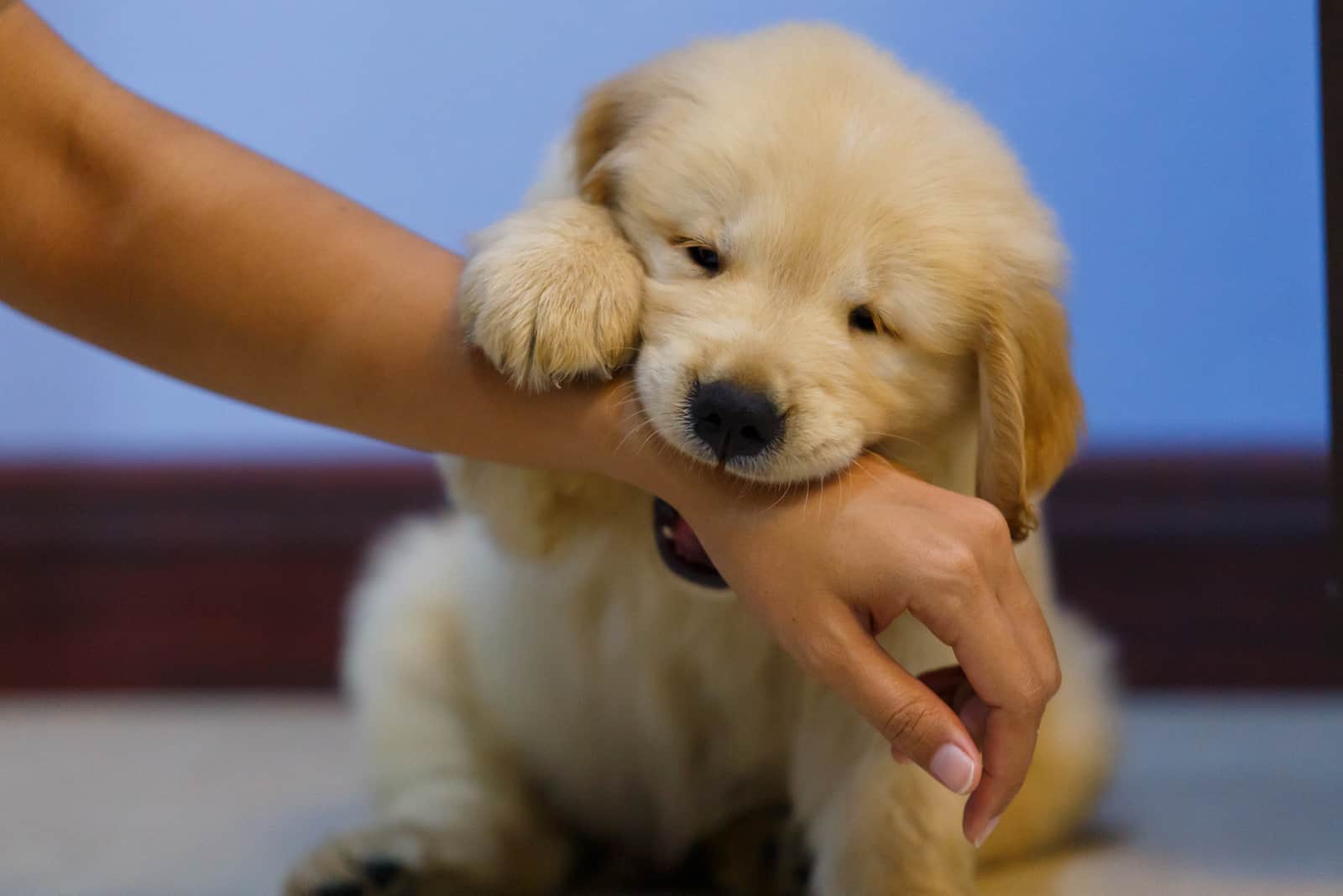
Yelping is usually seen within the puppy litter when little playmates take their play biting a bit too rough.
The yelping method is quite popular with paw parents. This method is based on you pretending to be extra hurt by your puppy. It is also connected with giving your new puppy a timeout.
So, here’s how it goes:
When your new puppy bites you, you should pretend like you’re its little playmate that got hurt. You literally act so hurt as if you’re crying for help because of the damage the puppy’s vicious jaws did to you.
During your yelp, don’t try to take your hand away from the puppy’s mouth. This will encourage it to hold onto your hand rather than let go of it. Instead, limp your hand and watch how the puppy will react after the yelp.
Once the puppy has let go of you, give it a short timeout. This will make it connect the bad thing he has done with the bad consequence – ignoring.
Even though it sounds like a method that will work 100%, there are still different opinions about it.
While it has worked for most new puppy owners, it hasn’t worked for some. What can happen is that the puppy will see yelping as a trigger. This can cause the puppy to get even more excited and start biting more than it previously did.
In the end, it all depends on the nature of your new puppy. The yelping method might not work because your puppy knows you’re not one of his kind. So, after a couple of unsuccessful yelping attempts, don’t continue trying to make it work.
6. Daily exercise.
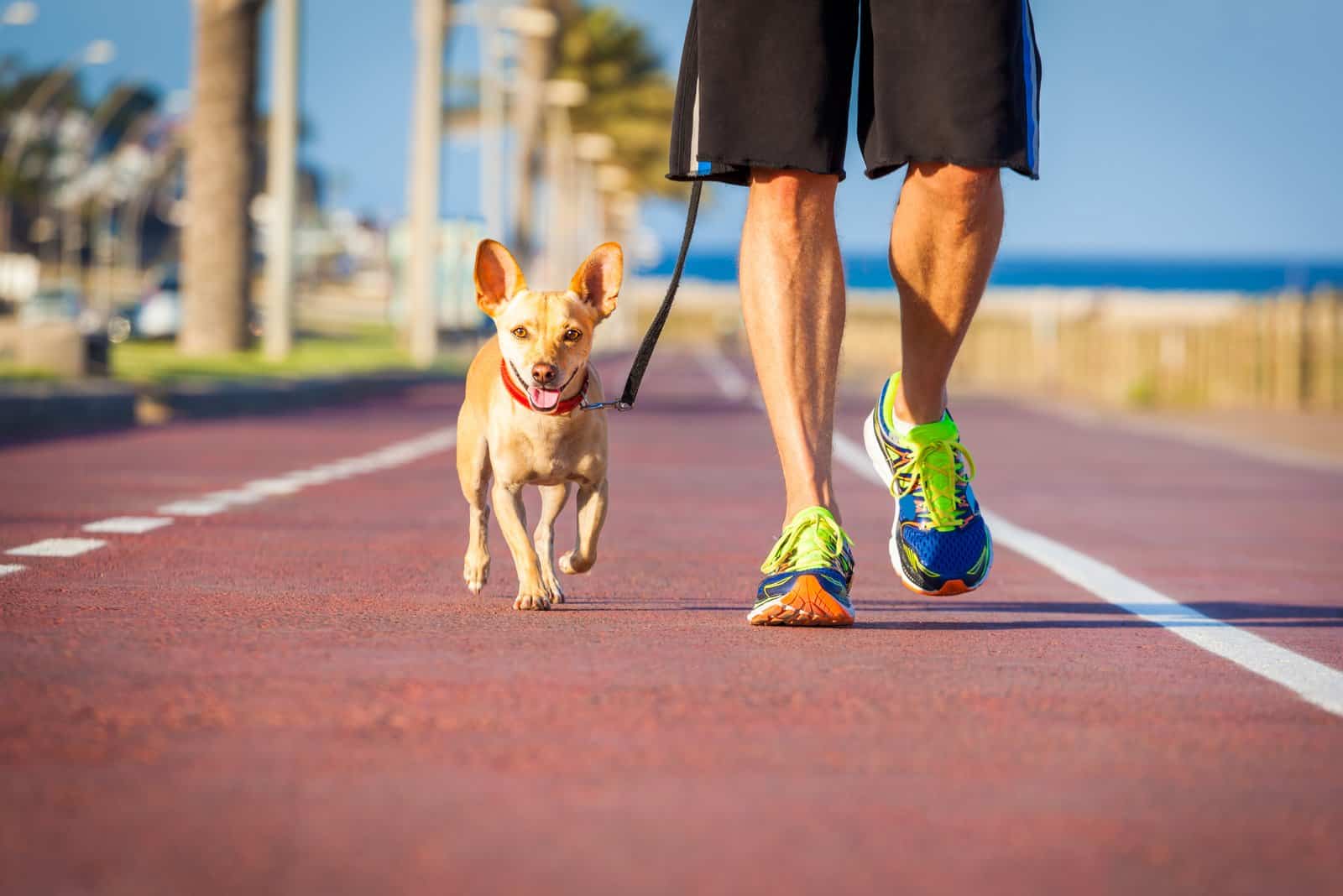
Daily exercise is wonderful for both the puppy and the owner. If you put this into your daily routine, your new puppy will definitely go crazy for you!
Not only is it beneficial for the puppy’s health, but daily exercise is a great way to let out the enormous amount of puppy energy.
With daily exercise, you keep your puppy away from boredom. Bored puppies tend to display more unwanted behaviors because they direct their excess energy towards chewing, biting, and nipping.
7. Voice command training.
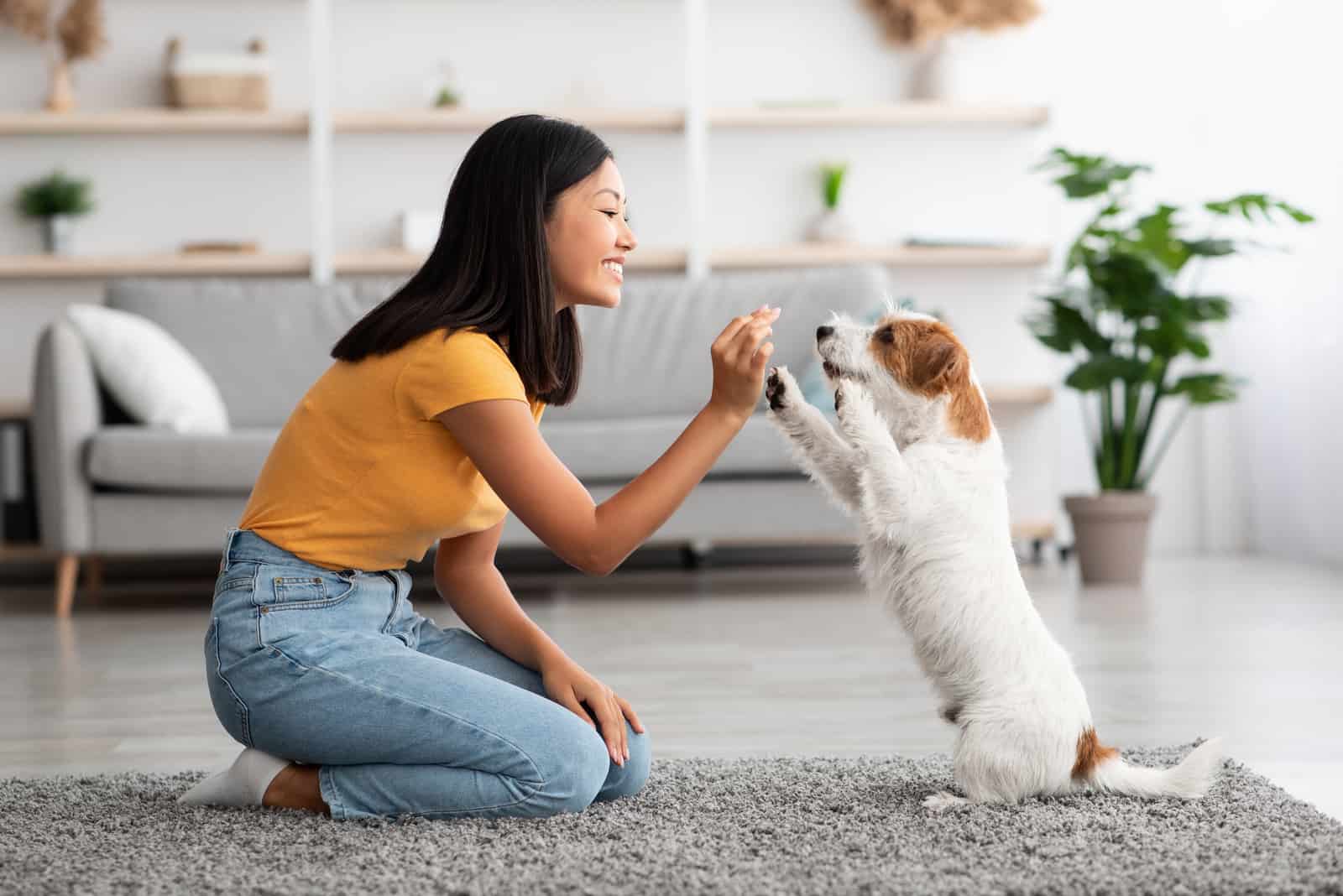
As the name implies, this is a type of training method that consists of different voice commands.
Little puppies are very smart. They’re like a sponge that quickly soaks up all knowledge. They’re quick learners, so teaching them a few words won’t be a problem.
When practicing voice command training, you should speak out the words louder than your usual voice tone.
Your new puppy should be able to differentiate the words: YES, NO, SIT, LEAVE IT, and LET GO.
The “NO” and “LEAVE IT” voice commands are the most important commands in puppy training because you’ll use these not only to stop puppy biting, but also to prevent unwanted behavior that might appear later in a dog’s life.
Voice command training + clicker training + positive reinforcement = success!
8. Quality playtime.
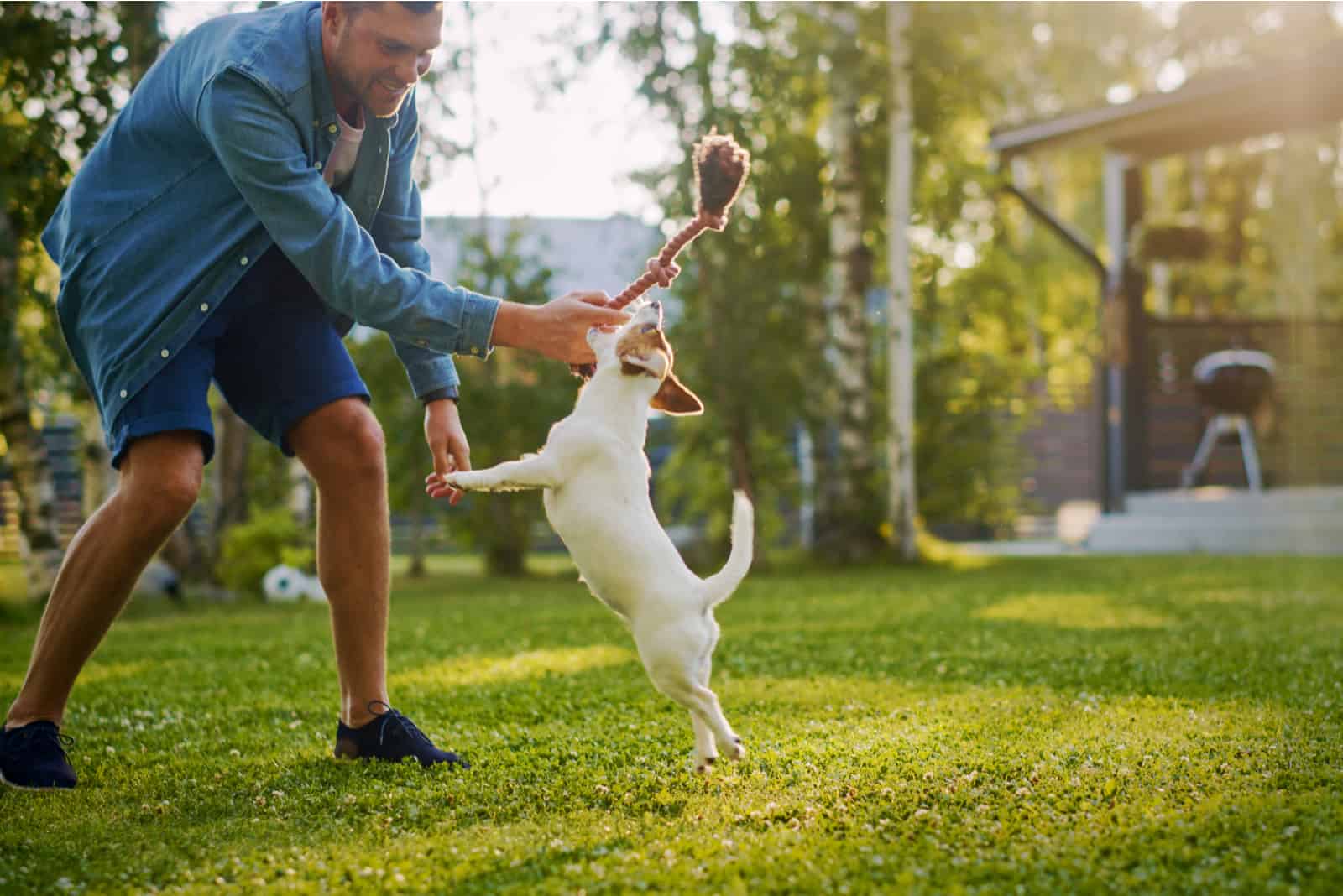
Quality playtime is a great way to bond with your new puppy. It’s also a great way to stop puppy biting.
Puppy toys are must-have items in the household. You’ll pretty much use them all the time during your puppy’s life.
Most puppy toys can be found on Amazon for reasonable prices. It doesn’t make much sense to spend a lot of money on a puppy toy that will be shredded in seconds by the litter biter!
Quality playtime doesn’t just involve chewing toys – it also involves fun activities and games you can play with your new puppy.
Playing fetch, tug of war, using a flirt pole, or playing frisbee with your pup will be very beneficial for its behavior.
Fun activities and distraction will keep your puppy from biting you, your family members, as well as your furniture.
9. Timeout.
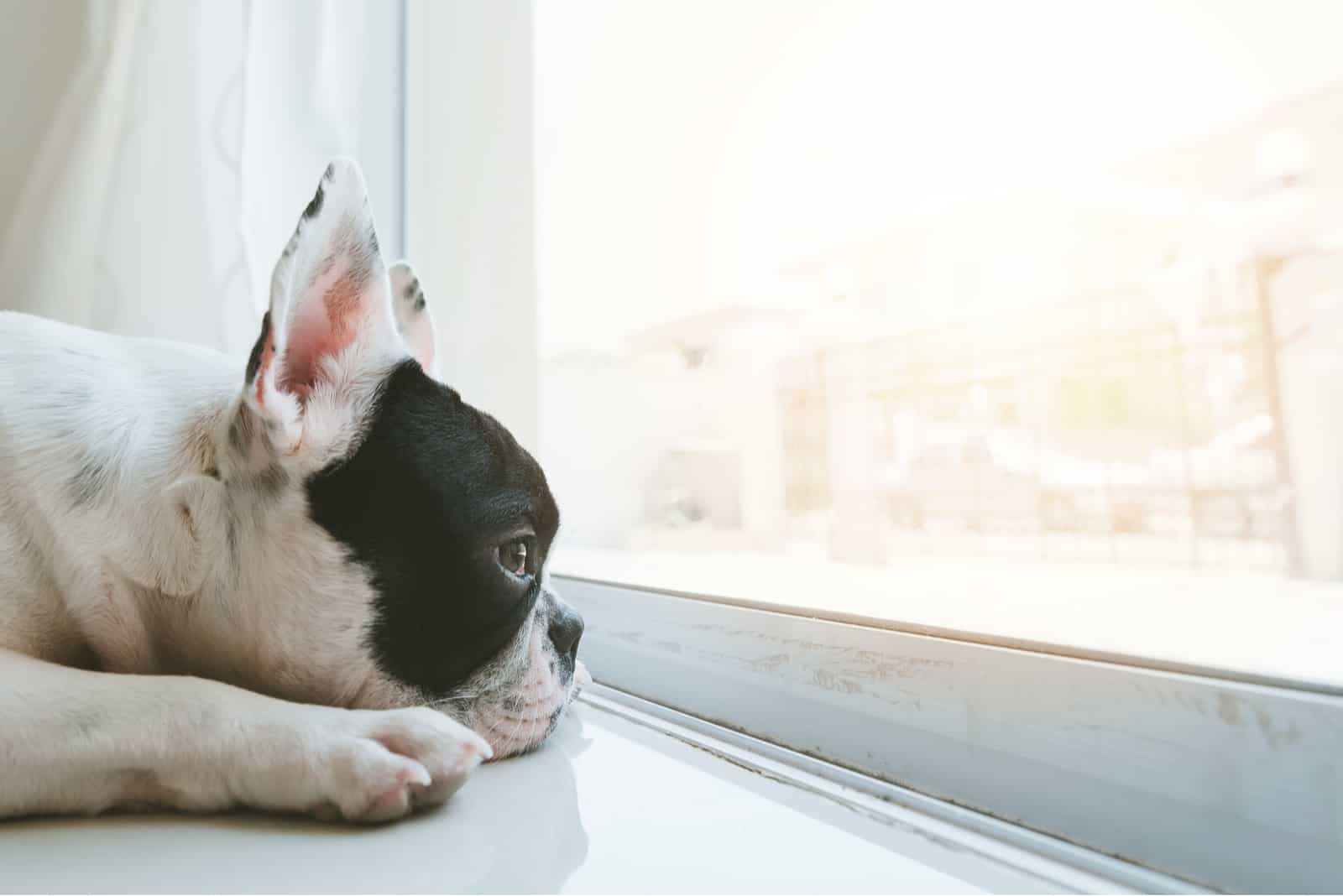
Timeout is basically when you get “hurt” by your new puppy and you decide to ignore it for 20 to 30 seconds.
This method is used when a puppy displays unwanted behavior. It’s actually your way of saying “hey, what you did was not nice, so the fun stops here”.
Puppies thrive when they know they have your attention. But, when they lose it even for a few seconds, they quickly realize something’s wrong.
A timeout right after your new puppy bites you will make it know that it hasn’t done something right, and that the playtime is over.
So, when your puppy bites you, you yelp and move to another room, or else you move your puppy to another room.
Timeout shouldn’t be considered a cruel punishment. It is a training method that helps your puppy connect that biting + human hand = no more playtime.
10. Keep it cool.
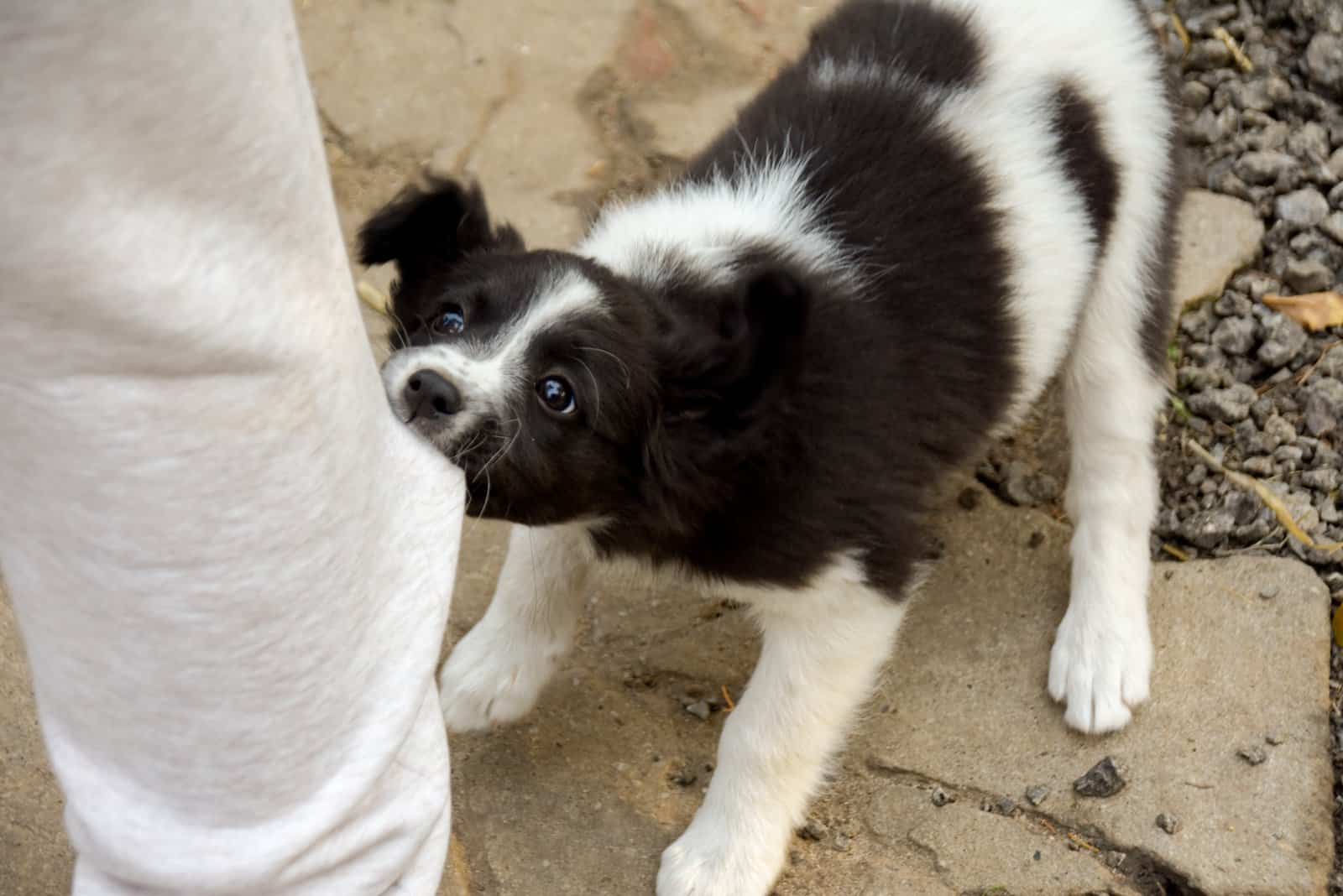
You’re probably reading this article because you’re stressed out and frustrated with your new puppy that won’t stop nipping.
We understand you completely. Training a new puppy is a full-time job, especially when they’re so stubborn and persistent.
If you’re a first-time dog owner, you might not have been ready for some of the puppy’s behavior issues.
It’s important to keep your cool. Don’t let yourself get frustrated if your puppy doesn’t listen to your command in the first couple of takes.
There’s a long way for you and your new best friend to go!
Puppy Biting: Harmless Puppy Play Or Aggression?
Biting is usually described as mouthing. It is divided into two types: playful mouthing and aggressive mouthing.
It is important to distinguish these two because the aggressive type of dog biting can result in an overall aggressive behavior in an adult dog. There is a huge difference between these two.
The playful dog bite
Playful biting between playmates is not that serious because each bite doesn’t actually penetrate the skin, nor does it cause injuries. This is, of course, normal dog biting behavior.
You will often see littermates display this kind of behavior. Your new puppy might see you as its playmate, so it will behave the same towards you as if it would to his puppy friends.
Light nibbling that doesn’t hurt you is acceptable to a certain degree.
The Aggressive dog bite
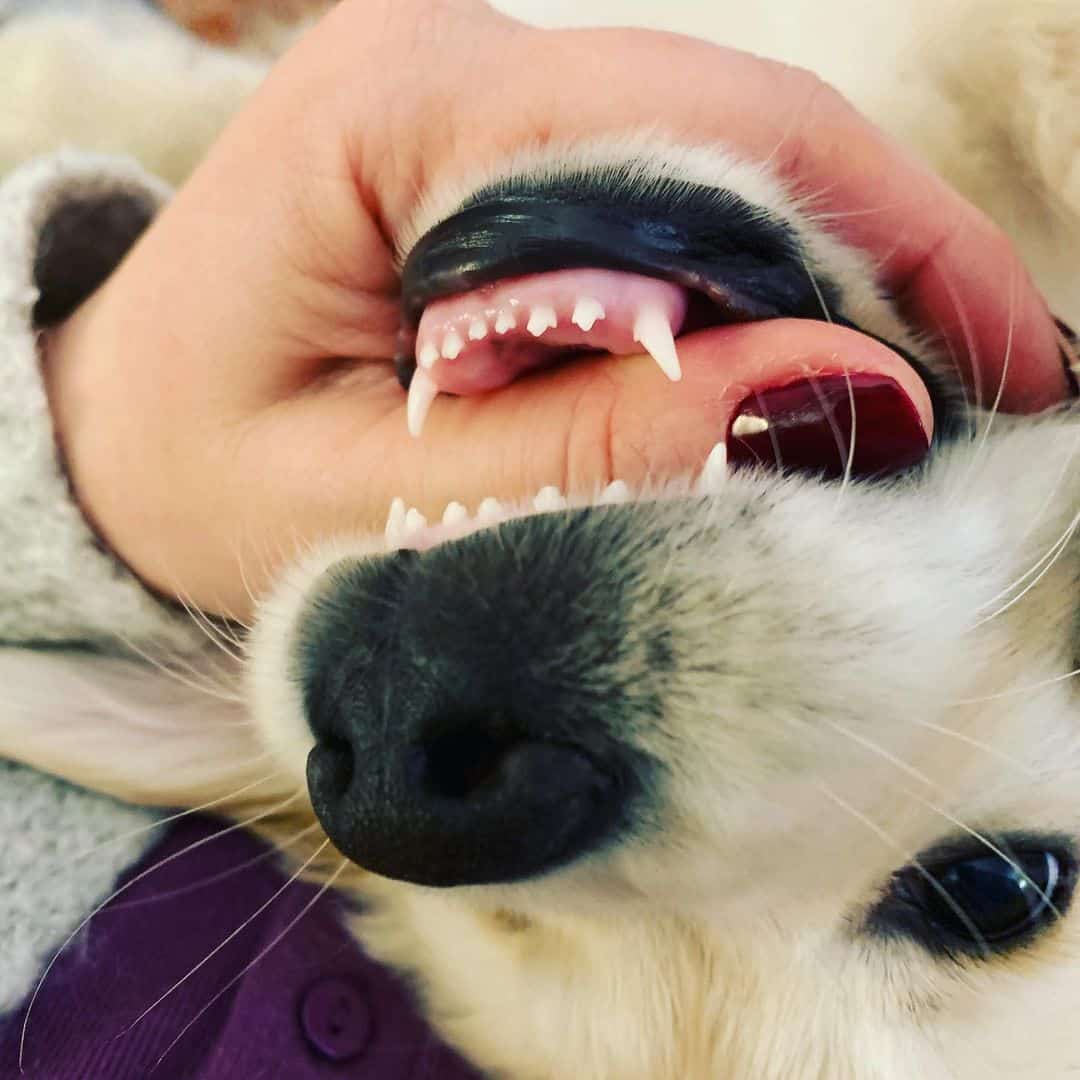
Photo from: @baileybluebaker
This is where roughhousing becomes serious. An aggressive behavior is certainly an unwanted behavior.
You can clearly see signs of aggressive behavior when your puppy starts pulling on things that it’s biting, or trying to shred them to bits all while growling and barking.
Pay close attention to your puppy’s body language. Dogs can’t tell you how they’re feeling or what they’re about to do.
But, body language speaks for itself, and it can say a lot about a dog’s behavior and what it’s about to do next. So, keep an eye out for your puppy’s stiff posture, with a fixed gaze and ears pinned back.
Always interrupt unwanted behavior and let your new puppy know that the playtime is over whenever it starts showing these signs.
My Puppy Still Keeps Biting!
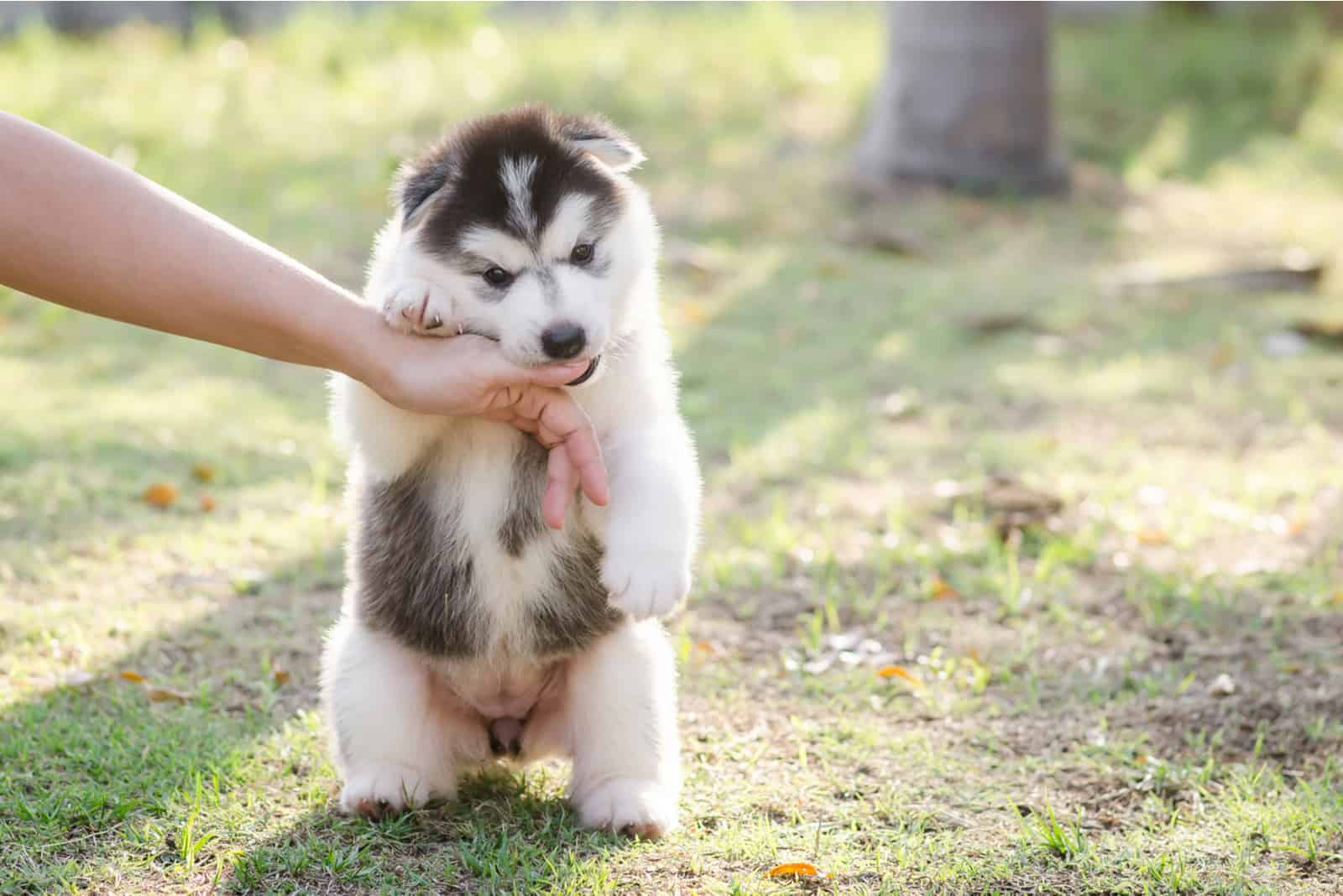
Teaching your new puppy to stop biting isn’t as easy as you may have thought. If you have tried everything and none of the training tips worked out, it is best that you seek a professional dog trainer.
Most dog trainers are dog behaviorists that have individual and group training from which you and your new puppy can benefit a lot.
Prolonged puppy biting can be caused by anxiety and frustration. When a puppy is upset, or his needs haven’t been met, it will start nibbling and mouthing more than it did before.
Therefore, it’s important to see these signs and take immediate action.
Final Thoughts
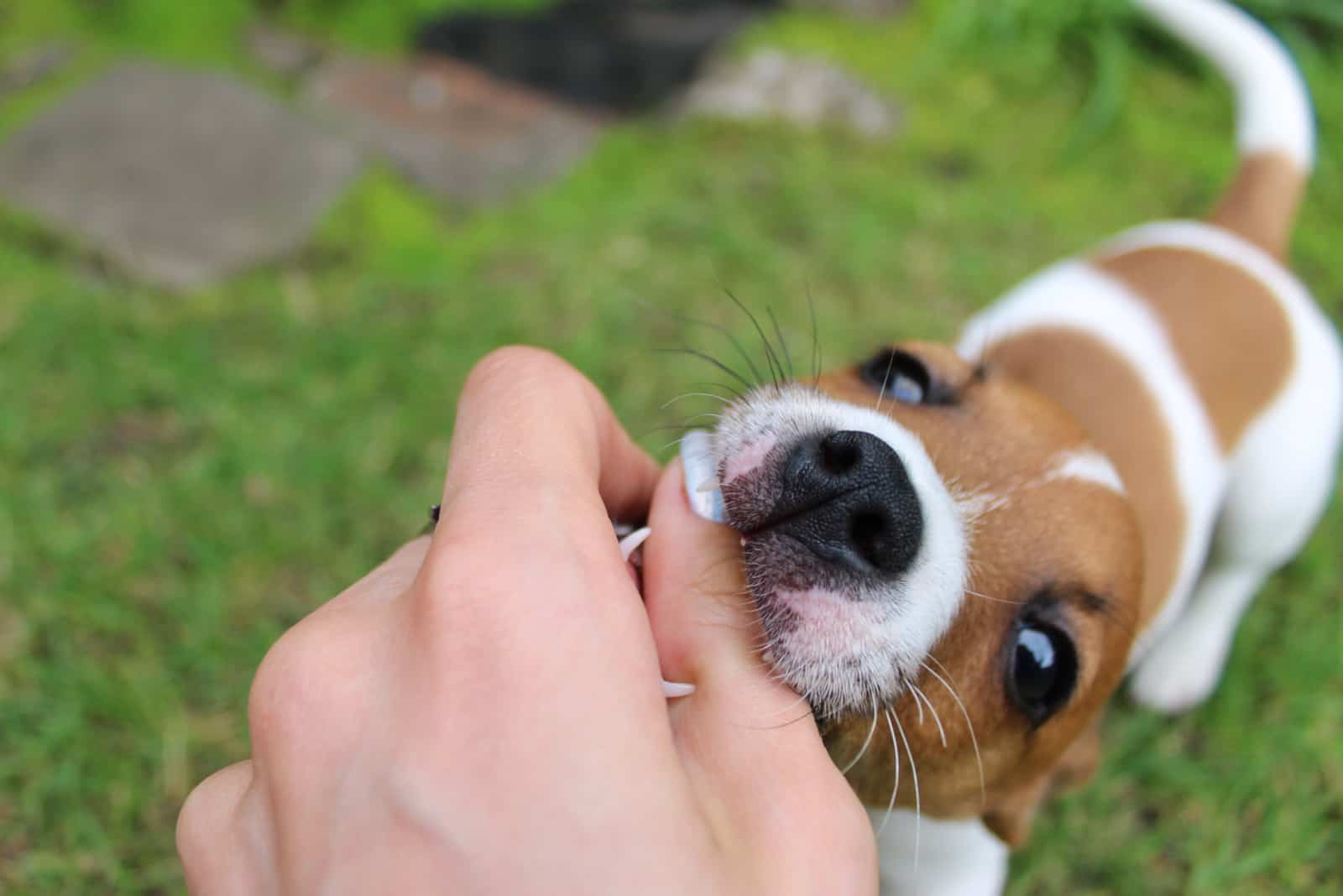
Puppy biting can sure be very frustrating for both first-time dog owners and experienced dog owners. Even some breeders might tell you they have it rough and tough when raising these little biters!
Puppy training is a hard task. It requires a lot of time, patience, effort, and most importantly, love! As much as it is frustrating, it is rewarding.
Persistence is another thing to have in mind. Try repeating these training tips daily and stick to your routine.
Hopefully, this article will help solve the “My puppy won’t stop biting me, I’ve tried everything” grievance that most puppy owners have.
By understanding the potential sources that are causing this specific puppy behavior, you’ll easily understand how to deal with it in the best possible way!
Soon enough, your new puppy will develop wonderful behavior and you will also have a sense of great achievement!
Read Next: Dog Corn Cobbing – 7 Reasons For This Peculiar Dog Behavior
